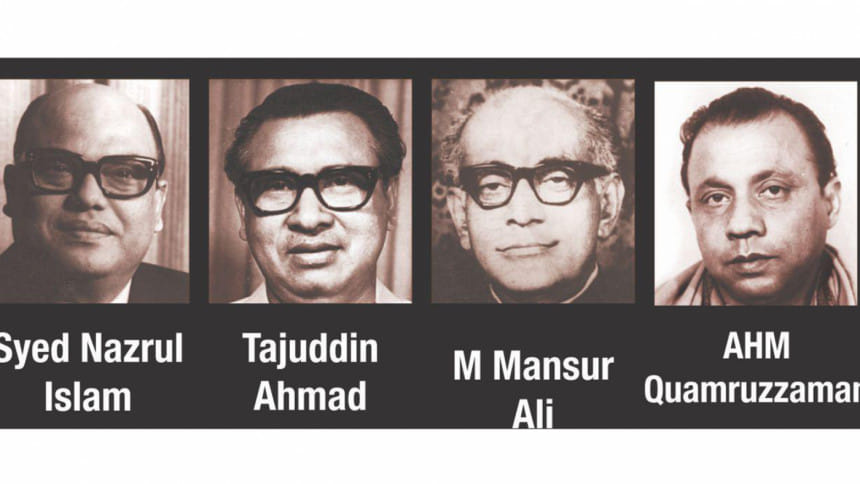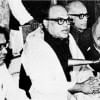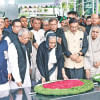Justice for 4 National Leaders: As elusive as ever

More than 14 years have passed since a trial court handed punishment to 11 perpetrators for the killing of four national leaders inside the erstwhile Dhaka central jail, but their sentence is yet be implemented.
The government could not even trace nine of them despite making strong efforts through diplomatic channels, intelligence agencies and the Interpol to bring the fugitives home.
Convicted killers Rashed Chowdhury and Noor Chowdhury are hiding in the USA and Canada respectively and the government has failed to bring them back.
Against such a backdrop, the nation pays tribute to slain national leaders Syed Nazrul Islam, Tajuddin Ahmad, AHM Quamruzzaman and M Mansur Ali on the 43rd anniversary of the Jail Killing Day today.
They were shot dead following repeated bayonet charges in the jail. The leaders were put behind bars soon after the August 15, 1975, bloodbath that claimed the lives of Bangabandhu and most of his family members.
The four leaders led the Liberation War in 1971 after Bangabandhu had been detained by the Pakistan army.
The government now insists that bringing all the 11 fugitives back home is a top-priority issue for it and efforts are on in all possible ways.
Talking to The Daily Star yesterday, Attorney General Mahbubey Alam said the government was trying through diplomatic and other channels to extradite the convicted killers to implement their sentences.
Alam, also a member of the taskforce formed in 2010 to bring home the killers, said some of the killers of Bangabandhu and the four national leaders were “same individuals” and four of them have already been executed.
Law Minister Anisul Huq last year said the government was planning to set up a commission to identify those who were behind the killings of Bangabandhu and the four national leaders.
Despite repeated attempts, this correspondent could not reach the minister over phone yesterday for comments.
The Appellate Division of the Supreme Court in its judgment in the jail killing case observed that the assassinations of the four national leaders were the result of a criminal conspiracy.
“The accused couldn't have executed the killings unless very high-handed powerful state machineries were involved in the conspiracy,” the then chief justice Surendra Kumar Sinha said in the verdict.
The apex court on April 30, 2013, had awarded death sentences to three former army personnel and life imprisonments to eight other people for killing the four national leaders.
The three accused handed capital punishment are Risalder (retd) Muslemuddin, Dafadar (dismissed) Marfat Ali Shah and Dafadar (dismissed) Abdul Hashem Mridha.
The eight jailed for life are Lt Col (dismissed) Khondaker Abdur Rashid, Lt Col (relieved) Shariful Haq Dalim, Lt Col (retd) SHMB Noor Chowdhury, Lt Col (retd) AM Rashed Chowdhury, Maj (relieved) Ahmed Shariful Hossain, Capt (retd) Abdul Majed, Capt (relieved) Kismat Hasem and Capt (relieved) Nazmul Hossain.
The SC upheld the judgment of a Dhaka court that sentenced Muslemuddin, Marfat and Hashem to death and handed life imprisonment to 12 others, including the eight, in 2004.
Four others -- Lt Col (dismissed) Syed Farooq-ur Rahman, Lt Col (retd) Sultan Shahriar Rashid Khan, Maj (retd) Bazlul Huda and Maj (retd) AKM Mohiuddin Ahmed -- were executed in the Bangabandhu murder case in 2010.
The following year, the SC exempted the four from the charges of killing the national leaders as they were executed.
Earlier in August 2008, the High Court had upheld the capital punishment for Muslemuddin and acquitted Marfat, Hashem, Farooq, Shahriar, Mohiuddin and Bazlul Huda in the jail killing case.
Barrister Abdullah Al Mamun, the state defence lawyer appointed by the SC for Marfat and Hashem, yesterday told this correspondent that he didn't know the whereabouts of the two convicted accused.
“Marfat Ali Shah, Abdul Hashem Mridha and their relatives have never communicated with me,” he added.

 For all latest news, follow The Daily Star's Google News channel.
For all latest news, follow The Daily Star's Google News channel. 








Comments